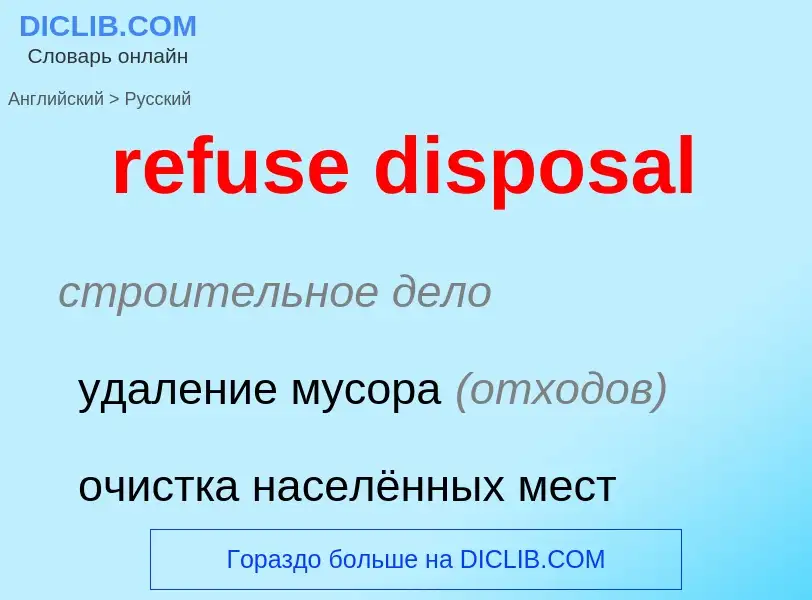Vertaling en analyse van woorden door kunstmatige intelligentie ChatGPT
Op deze pagina kunt u een gedetailleerde analyse krijgen van een woord of zin, geproduceerd met behulp van de beste kunstmatige intelligentietechnologie tot nu toe:
- hoe het woord wordt gebruikt
- gebruiksfrequentie
- het wordt vaker gebruikt in mondelinge of schriftelijke toespraken
- opties voor woordvertaling
- Gebruiksvoorbeelden (meerdere zinnen met vertaling)
- etymologie
refuse disposal - vertaling naar russisch
строительное дело
удаление мусора (отходов)
очистка населённых мест
[weistdi'spəuz(ə)l]
общая лексика
удаление отходов или сточных вод
удаление отходов
медицина
сброс отходов
строительное дело
удаление мусора (отходов, отбросов)
Definitie
)
Wikipedia

Waste management or waste disposal includes the processes and actions required to manage waste from its inception to its final disposal. This includes the collection, transport, treatment and disposal of waste, together with monitoring and regulation of the waste management process and waste-related laws, technologies, economic mechanisms.
Waste can be solid, liquid, or gases and each type has different methods of disposal and management. Waste management deals with all types of waste, including industrial, biological, household, municipal, organic, biomedical, radioactive wastes. In some cases, waste can pose a threat to human health. Health issues are associated throughout the entire process of waste management. Health issues can also arise indirectly or directly: directly through the handling of solid waste, and indirectly through the consumption of water, soil and food. Waste is produced by human activity, for example, the extraction and processing of raw materials. Waste management is intended to reduce adverse effects of waste on human health, the environment, planetary resources and aesthetics.
The aim of waste management is to reduce the dangerous effects of such waste on the environment and human health. A big part of waste management deals with municipal solid waste, which is created by industrial, commercial, and household activity.
Waste management practices are not uniform among countries (developed and developing nations); regions (urban and rural areas), and residential and industrial sectors can all take different approaches.
Proper management of waste is important for building sustainable and liveable cities, but it remains a challenge for many developing countries and cities. A report found that effective waste management is relatively expensive, usually comprising 20%–50% of municipal budgets. Operating this essential municipal service requires integrated systems that are efficient, sustainable, and socially supported. A large portion of waste management practices deal with municipal solid waste (MSW) which is the bulk of the waste that is created by household, industrial, and commercial activity. According to the Intergovernmental Panel on Climate Change (IPCC), municipal solid waste is expected to reach approximately 3.4 Gt by 2050; however, policies and lawmaking can reduce the amount of waste produced in different areas and cities of the world. Measures of waste management include measures for integrated techno-economic mechanisms of a circular economy, effective disposal facilities, export and import control and optimal sustainable design of products that are produced.
In the first systematic review of the scientific evidence around global waste, its management and its impact on human health and life, authors concluded that about a fourth of all the municipal solid terrestrial waste is not collected and an additional fourth is mismanaged after collection, often being burned in open and uncontrolled fires – or close to one billion tons per year when combined. They also found that broad priority areas each lack a "high-quality research base", partly due to the absence of "substantial research funding", which motivated scientists often require. Electronic waste (ewaste) includes discarded computer monitors, motherboards, mobile phones and chargers, compact discs (CDs), headphones, television sets, air conditioners and refrigerators. According to the Global E-waste Monitor 2017, India generates ~ 2 million tonnes (Mte) of e-waste annually and ranks fifth among the e-waste producing countries, after the United States, the People’s Republic of China, Japan and Germany.


![[[Waste picker]]s burning [[e-waste]] in [[Agbogbloshie]], a site near Accra in Ghana that processes large volumes of international electronic waste. The pickers burn the plastics off of materials, and collect the metals for recycling. However this process exposes pickers and their local communities to toxic fumes. [[Waste picker]]s burning [[e-waste]] in [[Agbogbloshie]], a site near Accra in Ghana that processes large volumes of international electronic waste. The pickers burn the plastics off of materials, and collect the metals for recycling. However this process exposes pickers and their local communities to toxic fumes.](https://commons.wikimedia.org/wiki/Special:FilePath/Agbogbloshie Ghana.jpg?width=200)
![An active [[compost]] heap An active [[compost]] heap](https://commons.wikimedia.org/wiki/Special:FilePath/Compost Heap.jpg?width=200)
![landfill compaction vehicle]] in action. landfill compaction vehicle]] in action.](https://commons.wikimedia.org/wiki/Special:FilePath/Landfill compactor.jpg?width=200)
![[[Manlove, Alliott & Co. Ltd.]] 1894 destructor furnace. The use of [[incinerator]]s for waste disposal became popular in the late 19th century. [[Manlove, Alliott & Co. Ltd.]] 1894 destructor furnace. The use of [[incinerator]]s for waste disposal became popular in the late 19th century.](https://commons.wikimedia.org/wiki/Special:FilePath/Manlove, Alliott furnace.jpg?width=200)

![Recycling point at the [[Gdańsk University of Technology]] Recycling point at the [[Gdańsk University of Technology]]](https://commons.wikimedia.org/wiki/Special:FilePath/Recycling point Gdansk University of Technology.jpg?width=200)
![A recycling point in [[Lappajärvi]], [[Finland]] A recycling point in [[Lappajärvi]], [[Finland]]](https://commons.wikimedia.org/wiki/Special:FilePath/Recycling point in Lappajärvi.jpg?width=200)
![[[Edwin Chadwick]]'s 1842 report ''The Sanitary Condition of the Labouring Population'' was influential in securing the passage of the first legislation aimed at waste clearance and disposal. [[Edwin Chadwick]]'s 1842 report ''The Sanitary Condition of the Labouring Population'' was influential in securing the passage of the first legislation aimed at waste clearance and disposal.](https://commons.wikimedia.org/wiki/Special:FilePath/SirEdwinChadwick.jpg?width=200)
![A specialized trash collection truck providing regular municipal trash collection in a neighborhood in [[Stockholm]], [[Sweden]] A specialized trash collection truck providing regular municipal trash collection in a neighborhood in [[Stockholm]], [[Sweden]]](https://commons.wikimedia.org/wiki/Special:FilePath/Sophämtning 2010.jpg?width=200)


![Tarastejärvi Incineration Plant in [[Tampere]], Finland Tarastejärvi Incineration Plant in [[Tampere]], Finland](https://commons.wikimedia.org/wiki/Special:FilePath/Tarastenjärven jätteenpolttolaitos.jpg?width=200)
